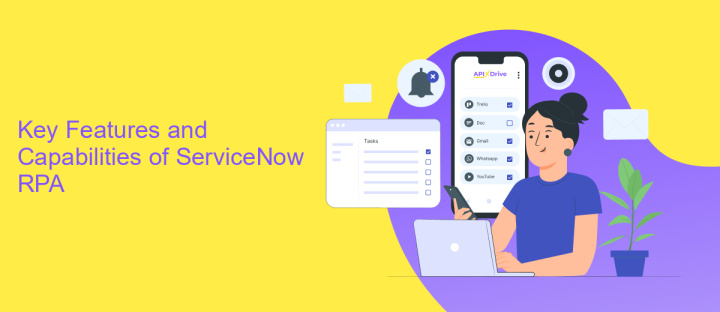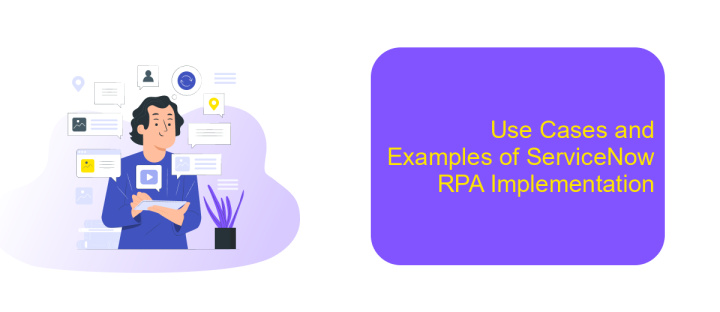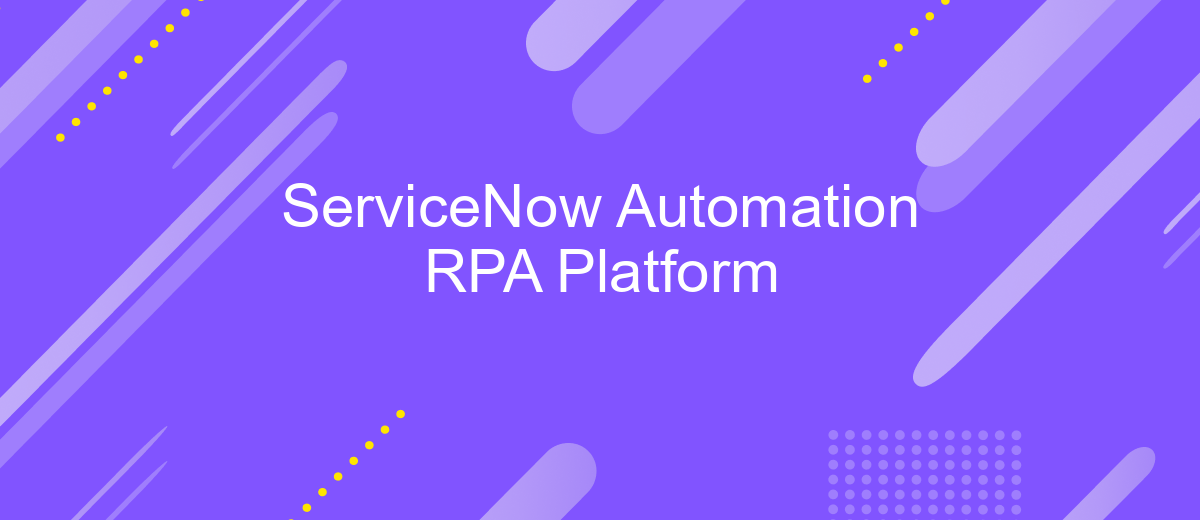ServiceNow Automation RPA Platform
ServiceNow Automation RPA Platform is revolutionizing the way businesses approach process automation by integrating advanced robotic process automation (RPA) capabilities. This platform empowers organizations to streamline workflows, enhance productivity, and reduce manual tasks through intelligent automation. By leveraging ServiceNow's robust infrastructure, businesses can achieve greater efficiency and accuracy, ultimately driving innovation and growth in today's competitive landscape. Discover how ServiceNow Automation RPA Platform can transform your operations and elevate your business to new heights.
Introduction to ServiceNow Automation and RPA
ServiceNow Automation and Robotic Process Automation (RPA) platform is revolutionizing the way businesses manage their operations by streamlining workflows and enhancing productivity. It offers a comprehensive suite of tools designed to automate repetitive tasks, allowing employees to focus on more strategic initiatives. By integrating RPA with ServiceNow, organizations can achieve seamless automation across various departments, improving efficiency and reducing operational costs.
- Enhanced workflow automation to minimize manual intervention
- Seamless integration with existing systems and applications
- Scalable solutions that grow with your business needs
- Advanced analytics and reporting for data-driven decision making
- Improved compliance and risk management through automated processes
By embracing ServiceNow Automation and RPA, businesses can transform their operations, driving innovation and competitiveness in the digital age. The platform's ability to adapt to evolving business environments ensures that organizations remain agile and responsive to market demands. As companies continue to navigate the complexities of digital transformation, ServiceNow provides the tools necessary to automate processes efficiently, leading to enhanced customer experiences and sustainable growth.
Key Features and Capabilities of ServiceNow RPA

ServiceNow RPA offers a comprehensive suite of features designed to enhance automation processes across various business functions. At its core, the platform provides robust capabilities for automating repetitive tasks, allowing organizations to streamline operations and increase efficiency. With its intuitive drag-and-drop interface, users can easily create and deploy bots without the need for extensive coding knowledge, making it accessible for teams of all skill levels. Additionally, the platform's advanced analytics offer real-time insights into bot performance, enabling continuous optimization and improvement.
Integration capabilities are a standout feature of ServiceNow RPA, facilitating seamless connectivity with a wide array of third-party applications and systems. This is further enhanced by services like ApiX-Drive, which simplify the integration process, allowing businesses to connect their existing tools effortlessly. By leveraging these integrations, organizations can ensure a cohesive workflow, reducing manual data entry and minimizing errors. Furthermore, ServiceNow RPA's security features ensure that all automated processes adhere to strict compliance standards, safeguarding sensitive data and maintaining organizational integrity.
Benefits of Using ServiceNow RPA Platform

The ServiceNow RPA Platform offers a transformative approach to automating business processes, enhancing operational efficiency across various industries. By leveraging robotic process automation, businesses can streamline repetitive tasks, reduce human error, and free up valuable employee time for more strategic activities. This platform integrates seamlessly with existing systems, ensuring a smooth transition and minimal disruption to daily operations.
- Increased Efficiency: Automating routine tasks significantly speeds up processes, allowing employees to focus on higher-value tasks.
- Cost Reduction: By minimizing manual labor, organizations can lower operational costs and improve their bottom line.
- Scalability: The platform can easily scale to accommodate growing business needs without extensive reconfiguration.
- Improved Accuracy: Automation reduces the risk of human error, ensuring more consistent and reliable outcomes.
- Enhanced Compliance: With automated processes, businesses can maintain better compliance with industry regulations and standards.
Implementing the ServiceNow RPA Platform not only optimizes workflows but also fosters innovation by allowing teams to dedicate more time to creative problem-solving. This strategic advantage ensures that businesses remain competitive in an ever-evolving market landscape, positioning them for sustained growth and success.
Use Cases and Examples of ServiceNow RPA Implementation

ServiceNow's RPA platform is revolutionizing how businesses automate repetitive tasks, enhancing efficiency and reducing human error. By integrating RPA into their operations, organizations can streamline workflows and optimize resource allocation. ServiceNow RPA is particularly beneficial in environments where manual processes are time-consuming and prone to mistakes.
One common use case is in IT service management, where RPA bots handle routine tasks like password resets and system updates, freeing up IT staff to focus on more complex issues. Additionally, in the finance sector, RPA can automate invoice processing and reconciliation, ensuring accuracy and compliance while speeding up transaction times.
- Customer service: Automating responses to common inquiries and processing service requests.
- HR operations: Streamlining employee onboarding and data entry processes.
- Supply chain: Enhancing inventory management and order processing efficiency.
By implementing ServiceNow RPA, companies can achieve significant cost savings and improve service delivery. The platform's ability to integrate seamlessly with existing systems ensures that businesses can leverage automation without extensive infrastructure changes. As a result, ServiceNow RPA is a versatile tool that can be adapted to various industries and operational needs.
- Automate the work of an online store or landing
- Empower through integration
- Don't spend money on programmers and integrators
- Save time by automating routine tasks
Conclusion and Future of ServiceNow RPA
The ServiceNow RPA platform represents a significant step forward in automating business processes, enhancing efficiency, and reducing operational costs. With its robust capabilities, organizations can streamline workflows, automate repetitive tasks, and focus on strategic initiatives. As the demand for automation continues to grow, ServiceNow's RPA platform is poised to evolve, incorporating more advanced AI and machine learning technologies to offer even more sophisticated automation solutions.
Looking ahead, the future of ServiceNow RPA is promising, with potential integrations expanding its capabilities. Services like ApiX-Drive could play a crucial role in seamlessly connecting various applications, enabling organizations to build more complex automation workflows without extensive coding. As businesses increasingly adopt digital transformation strategies, ServiceNow RPA is expected to become an integral part of their toolkit, driving innovation and productivity. By continually adapting to technological advancements and customer needs, ServiceNow will likely maintain its position as a leader in the RPA space, offering scalable and adaptable solutions for diverse industries.
FAQ
What is ServiceNow Automation RPA Platform?
How can ServiceNow RPA enhance business processes?
Is it possible to integrate ServiceNow RPA with other applications?
What kind of tasks can be automated using ServiceNow RPA?
How does ServiceNow RPA ensure data security and compliance?
Time is the most valuable resource in today's business realities. By eliminating the routine from work processes, you will get more opportunities to implement the most daring plans and ideas. Choose – you can continue to waste time, money and nerves on inefficient solutions, or you can use ApiX-Drive, automating work processes and achieving results with minimal investment of money, effort and human resources.


